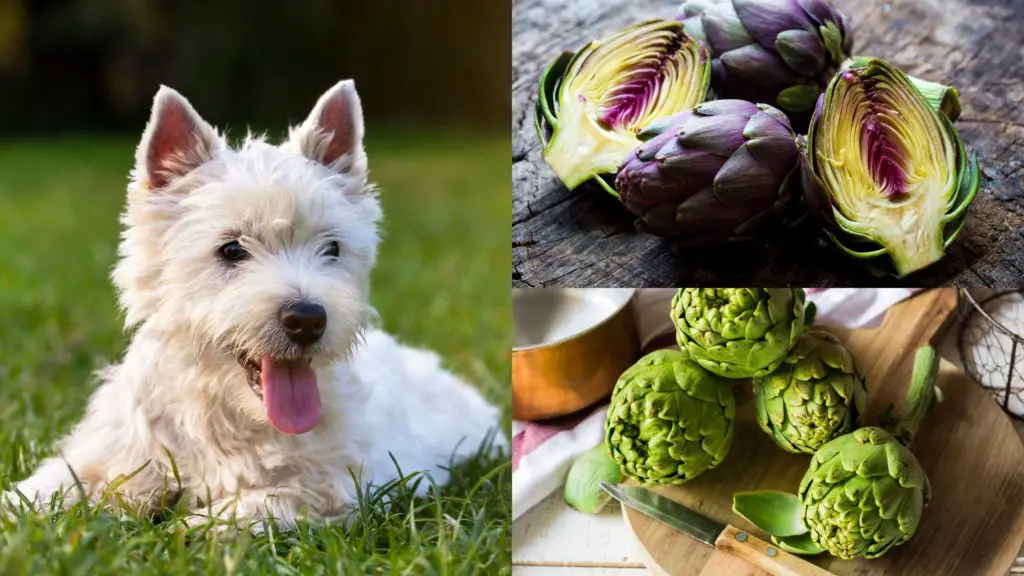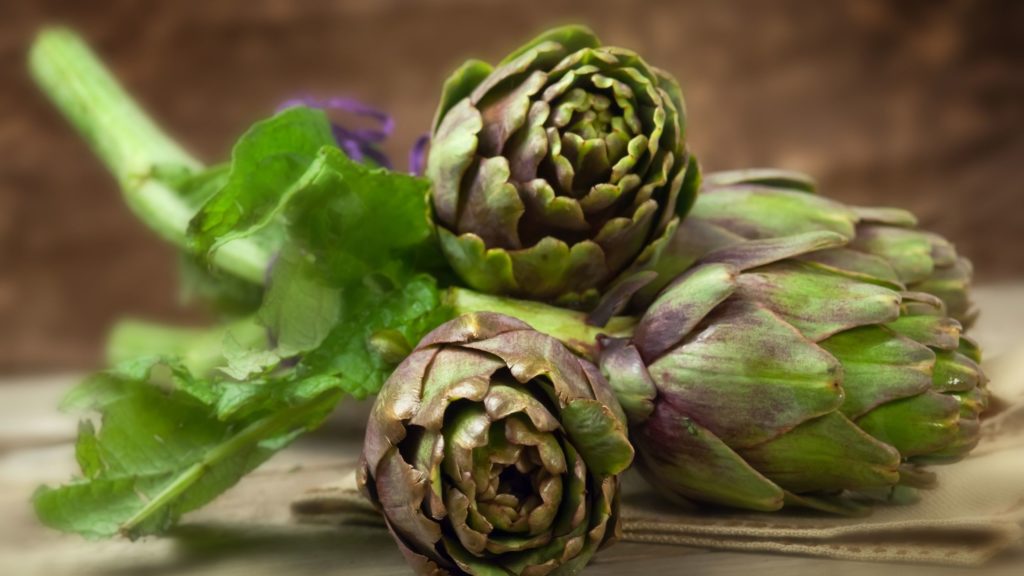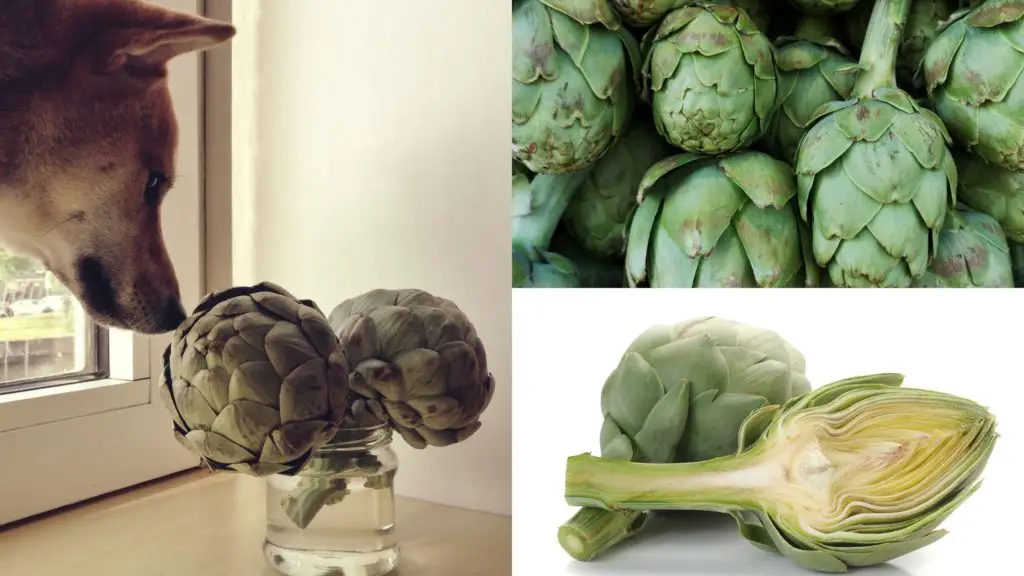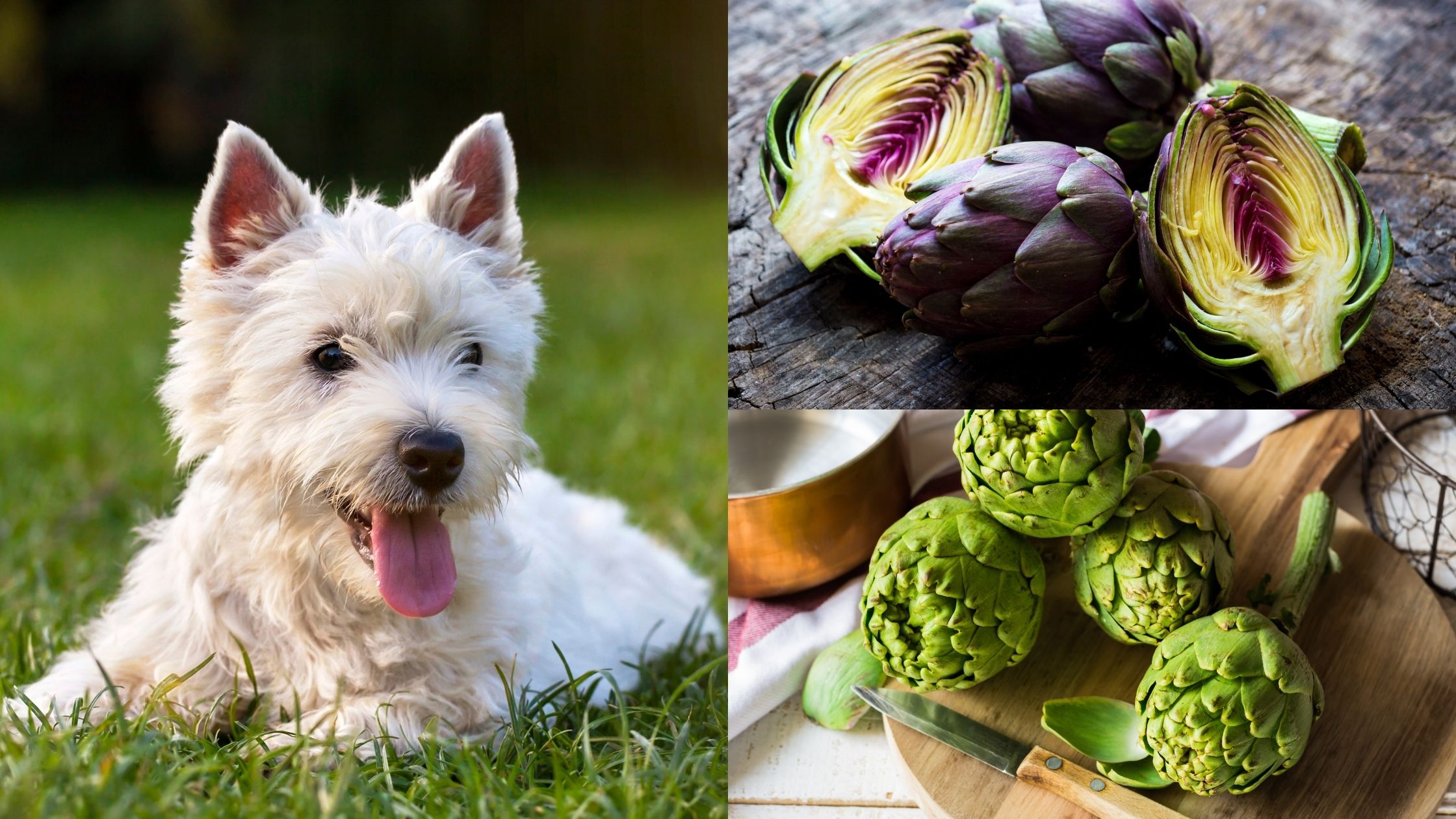Last Updated on 08/04/2021 by Veronica Jones
Dogs need a lot more than just regular kibble in their diets to stay strong. Your dog deserves the best of the best, so they need the right nutrition to stay healthy and happy. However, you may not be sure about what your dog can eat, as dogs cannot eat all fruits and veggies.
A common question you may wonder is, “Can dogs eat artichokes?” To help you learn more about if dogs can have artichokes, the benefits, side effects and more, here is everything you need to know.
Can Dogs Eat Artichokes?
Yes, dogs can eat artichokes. While this is not the ideal veggie to give to your dog on a regular basis, it is fine in moderation. Most healthy dogs can have a bit of artichoke on occasion as a nutritional snack, but it should not be a weekly treat.
Artichokes are not the top vegetable of choice for dogs to eat. They do have nutrients that can benefit your dog, especially if you want a healthy treat for overweight pups. However, there are better veggies to give to your pooch instead of artichokes if you have the option.

What Happens if a Dog Eats Artichokes?
In most cases, nothing will happen to a dog after eating artichokes. Generally, healthy dogs can eat them without any issues. If it is chopped small enough for them to bite, there should be no issue.
A cooked or fresh artichoke is not a toxic veggie for dogs, even the leaves and stem are fine for pooches to eat. The entire vegetable is safe for pups to eat. If your dog snags a bit of artichoke off the table, you probably do not have to worry.
The main times you would need to bring a dog to the vet after they eat artichokes is if there are signs of pain or blockages. For instance, hacking may indicate that your dog is choking. Lack of appetite and diarrhea could mean that your dog ate too much artichoke or they have an intestinal blockage.
Can Artichokes Hurt Dogs?
The main risk that artichokes pose is a blockage in the digestive tract. It can cause choking or problems with their intestine. However, this typically occurs because of a lack of proper chewing and large portions of artichoke. You can prevent this by cutting the artichoke to more chewable pieces.
In rare cases, it could cause allergic reactions or stomach issues in dogs. However, this is very uncommon. Generally, artichokes are not dangerous. Dogs may only get issues if they consume excessive amounts of artichoke, which is very hard to do.
Can Dogs Eat Fresh Artichokes?
Yes, it is generally safe for dogs to eat fresh artichokes. However, they may not be very inclined to do so, as they probably won’t be very appealing to them. There is also a greater chance of your dog choking on it. If you do choose to feed your dog raw artichokes, please do cut them up small.
A Guide to Feeding Your Dog Artichokes
If you do choose to feed your dog artichokes you do need to follow a few simple rules. The main rule is to make sure you don’t give them anything that could get stuck, either in their throat or by causing an intestinal blockage. The best way to avoid this is to cut the artichoke into small pieces (think bite sized pieces). The other is to consider cooking the artichoke, to make it softer. If it’s in small pieces and cooked, then, generally, artichokes are safe for your canine companion.

The Benefits of Artichokes for Dogs
Artichokes are a fairly good snack for dogs to enjoy and has some health benefits. Some dogs enjoy artichokes, and will gladly eat it. While they are not the most nutritious snack available, it is still a good food for them to have in moderation.
Artichokes contain vitamin C and antioxidants. This helps improve energy, reduce inflammation and potentially prevent UTIs. Antioxidants are important to remove nasty free radicals from the body. Vitamin C is also a type of antioxidant that can work with antioxidants to strengthen the immune system and potentially slow down aging.
Artichokes have a lot of potassium, and dogs need potassium to stay healthy. Potassium helps your pup’s muscles function properly. Moreover, it is also important for your dog’s enzymes and nerves.
Artichokes are also high in fiber, which is great for any dog. It helps ensure that they regularly go to the toilet since it helps digestion. Fiber ferments when eaten, creating fatty acids that prevent bad bacteria in the your pet’s digestive tract.
Therefore, artichokes can help dogs who have problems with their digestive system. For instance, some dogs may fart a lot, or have irritable bowel syndrome. The nutrients in artichokes can be fantastic for your pup.
Artichokes are a fine treat to give to overweight pooches. They are low in cholesterol, fat and calories. Plus, the fiber that this veggie has can help your dog feel full for longer. That way, your dog will feel more satisfied until their next meal.
Artichokes contain B-complex vitamins, like folic acid and niacin. These vitamins are essential for dogs because it can maintain heart health and how the nervous system functions. Moreover, B vitamins enhance your dog’s coat to make it shiny and beautiful. B vitamins can also support red blood cell growth and regulate their energy.
The Side Effects of Artichokes for Dogs
There are no major risks to feeding a dog artichoke. However, there are only minimal risks if a dog eats a little artichoke in moderation. Your dog should not artichoke as a part of their regular diet. It does not offer the same nutrients that veggies like kale can offer, so there are better alternatives for your dog.
Too much artichoke can cause problems with your dog’s digestive tract. Artichokes have a lot of fiber, and excessive fiber can be a bad thing. Too much fiber can make it hard for a dog to absorb minerals, and it can cause diarrhea. Some other symptoms they may experience include gas, tenderness or pain in the stomach area, etc.
Other than that, the main risk is that artichokes can cause blockages. An artichoke can be a choking hazard. Artichokes can also cause blockages in the intestines, leading to constipation or diarrhea. However, this only happens if your dog eats big pieces quickly. Serve your dog small, bite-sized artichoke pieces slowly.
What Parts of the Artichokes Can Dogs Eat?
Your dog can eat pretty much any part of the artichoke. They can eat the hearts, stems and leaves of the artichoke. However, it may be best to give them the petal meat instead.
Make sure that you always give your dog good artichoke. You ought to never give dark, oddly soft or rotten artichoke parts to your dog. These can upset your dog’s tummy, causing pain, diarrhea, gas, etc.

What Kinds of Artichokes Can Dogs Eat?
Dogs can eat fresh and cooked artichoke. However, they can only eat cooked artichoke if it is boiled or steamed. Fried artichoke or artichoke used in recipes can contain lots of ingredients that dogs should not eat, like salt and garlic. As for the type of artichoke, they can eat most kinds of artichokes.
Keep in mind that most store- and machine-prepared artichoke or artichoke in recipes are not good for dogs. They have many other ingredients that are bad for dogs. For instance, spinach and artichoke dips often contain lots of salt and additives. Jarred and canned artichokes have tons of oil, onions, garlic, salt, etc. that can harm your pooch.
How Much Artichoke Can a Dog Eat?
There is no exact measurement to how much artichoke a dog can eat. If your dog has never tried artichoke, they can try a small piece. Observe them for 1-2 days to see how they react. They can have a bit more in 2-3 weeks if they have no adverse reactions.
Typically, it is best to only give 1-3 bites of artichoke to your dog 1-2 times a month. However, it is fine to never give them artichokes either. Other veggies like spinach and carrots are better for dogs to eat regularly.
How Do You Cook Artichokes for Dogs?
You can serve artichoke to your dog cooked or raw. Ideally, raw and fresh artichoke is best to give to your dog because it allows them to maximize all the nutrients. Make sure you do not give any rotten parts to your dog.
You may also cook artichoke for your dog, if desired. However, you should never use ingredients like oil, butter or salt to cook because that is bad for your dog. Just opt for boiling or steaming your dog’s artichoke.
Whether you serve it raw or cooked, it is important to make sure your dog can easily eat it. Clean the artichoke thoroughly. Cut the artichoke into bite-sized pieces for your dog. This will prevent intestinal blockages and choking.
Can Puppies Eat Artichoke?
No, puppies should not eat artichoke. While it may not harm them, it is best to not shock your puppy’s stomach with unfamiliar food. They can get upset stomachs and vomit, making it best to avoid artichoke for now.
Puppies should stick to their main diet along with more nutritious fruits and veggies. You can give dogs a bit of artichoke when they are adults. Preferably, you should wait until your dog is at least 1 year old until they have a little artichoke, but it is fine to never give them artichoke.
All in All
Artichokes are safe to give your dog in moderation. It has loads of nutrients like fiber and vitamin C to support a dog’s health. Plus, the whole artichoke is not toxic to dogs. However, there are still better veggies to give to your dog if you want to start adding more veggies to your pooch’s diet. If your dog ate a little artichoke, they will likely be fine and not need any medical attention.
More Dog Feeding Advice
It can be really difficult to know if a food is suitable for a dog. Sometimes, foods that we consider completely harmless to humans can be fatal for dogs. It’s really important to check if you are at all unsure. Here are some more helpful articles about common human foods and their suitability for dogs. We hope you find them useful…
- Can Dogs Eat Onions: Are Onions Toxic for Dogs?
- Can Dogs Eat Wasabi (Paste, Peas, Almonds or Sushi)?
- Can Dogs Eat Jasmine Rice: Why is Jasmine Rice OK for Dogs?
- Can Dogs Eat Raspberries? Are Raspberries Safe or Bad for Dogs?
- Can Dogs Eat Hummus? Is it Good for Dogs?
References:
- American Kennel Club, ‘7 Vitamins Your Dog Needs for a Healthy Life’, https://www.akc.org/expert-advice/nutrition/vitamins-dogs-need-healthy-lifestyle/, Date Accessed – 15 July, 2021
- American Kennel Club, ‘Benefits of High-Fiber Dog Foods’, https://www.akc.org/expert-advice/nutrition/benefits-high-fiber-dog-foods/., Date Accessed – 15 July, 2021
- NBCI, ‘Gut Fermentation of Dietary Fibres: Physico-Chemistry of Plant Cell Walls and Implications for Health’, https://www.ncbi.nlm.nih.gov/pmc/articles/PMC5666883/, Date Accessed – 15 July, 2021
- Pet Poison Helpline, ‘IS TABLE FOOD POISONOUS FOR DOGS?’, https://www.petpoisonhelpline.com/pet-safety-tips/is-table-food-poisonous-for-dogs/, Date Accessed – 15 July, 2021

